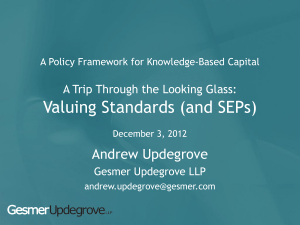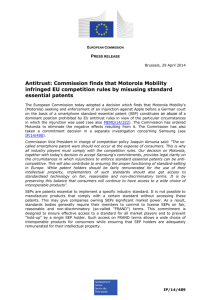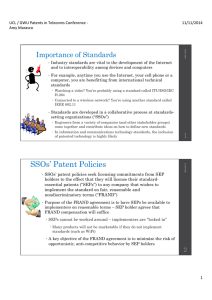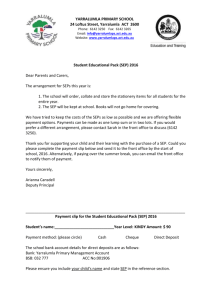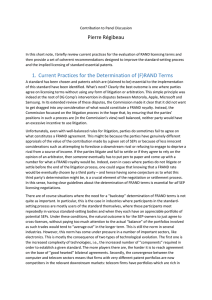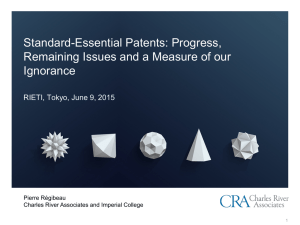European Commission limits Ability to seek
advertisement
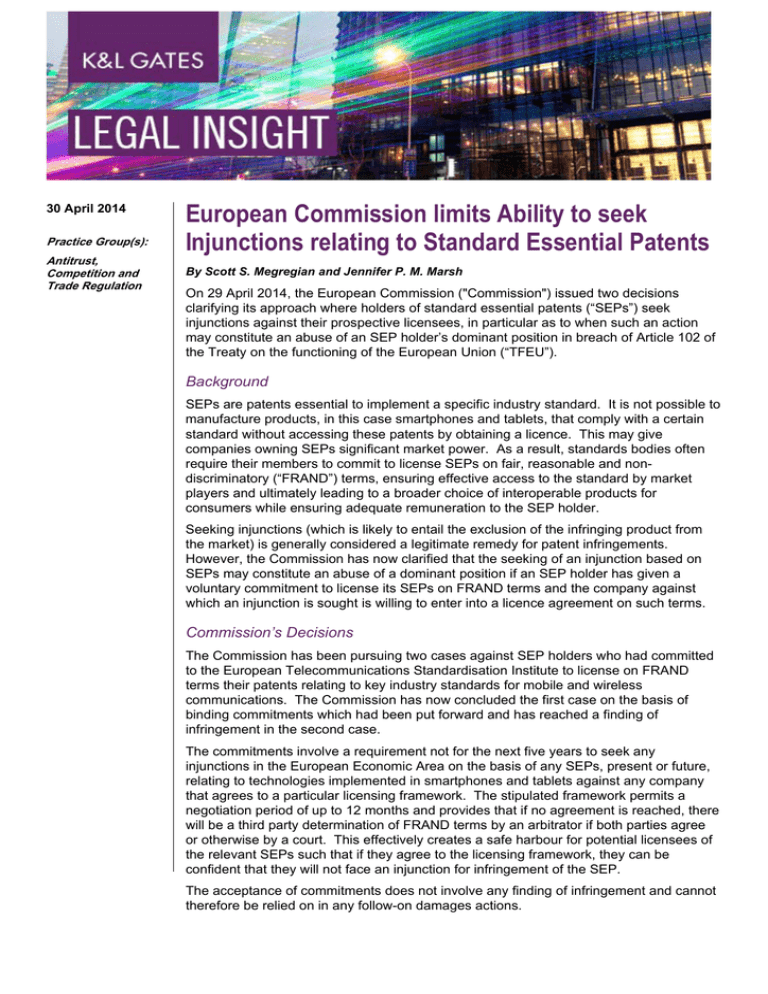
30 April 2014 Practice Group(s): Antitrust, Competition and Trade Regulation European Commission limits Ability to seek Injunctions relating to Standard Essential Patents By Scott S. Megregian and Jennifer P. M. Marsh On 29 April 2014, the European Commission ("Commission") issued two decisions clarifying its approach where holders of standard essential patents (“SEPs”) seek injunctions against their prospective licensees, in particular as to when such an action may constitute an abuse of an SEP holder’s dominant position in breach of Article 102 of the Treaty on the functioning of the European Union (“TFEU”). Background SEPs are patents essential to implement a specific industry standard. It is not possible to manufacture products, in this case smartphones and tablets, that comply with a certain standard without accessing these patents by obtaining a licence. This may give companies owning SEPs significant market power. As a result, standards bodies often require their members to commit to license SEPs on fair, reasonable and nondiscriminatory (“FRAND”) terms, ensuring effective access to the standard by market players and ultimately leading to a broader choice of interoperable products for consumers while ensuring adequate remuneration to the SEP holder. Seeking injunctions (which is likely to entail the exclusion of the infringing product from the market) is generally considered a legitimate remedy for patent infringements. However, the Commission has now clarified that the seeking of an injunction based on SEPs may constitute an abuse of a dominant position if an SEP holder has given a voluntary commitment to license its SEPs on FRAND terms and the company against which an injunction is sought is willing to enter into a licence agreement on such terms. Commission’s Decisions The Commission has been pursuing two cases against SEP holders who had committed to the European Telecommunications Standardisation Institute to license on FRAND terms their patents relating to key industry standards for mobile and wireless communications. The Commission has now concluded the first case on the basis of binding commitments which had been put forward and has reached a finding of infringement in the second case. The commitments involve a requirement not for the next five years to seek any injunctions in the European Economic Area on the basis of any SEPs, present or future, relating to technologies implemented in smartphones and tablets against any company that agrees to a particular licensing framework. The stipulated framework permits a negotiation period of up to 12 months and provides that if no agreement is reached, there will be a third party determination of FRAND terms by an arbitrator if both parties agree or otherwise by a court. This effectively creates a safe harbour for potential licensees of the relevant SEPs such that if they agree to the licensing framework, they can be confident that they will not face an injunction for infringement of the SEP. The acceptance of commitments does not involve any finding of infringement and cannot therefore be relied on in any follow-on damages actions. European Commission limits Ability to seek Injunctions relating to Standard Essential Patents In the second case, the Commission reached a finding that Article 102 TFEU prohibiting the abuse of a dominant position had been breached by the SEP holder seeking and enforcing an injunction against its prospective licensee, which had agreed to a licence and to be bound by a determination of the FRAND royalties by the relevant German court. The Commission also considered to be anti-competitive the SEP holder’s insistence that the licensee give up its rights to challenge the validity of the SEPs or the licensee’s infringement of them. Nevertheless, the Commission decided not to impose a fine on the SEP holder in view of the legal uncertainty regarding the disputed conduct but only to require that the negative effects of the infringing conduct must be eliminated. Impact In light of the Commission’s decisions, SEP holders looking to enforce their patents should be mindful of the obligation to offer FRAND terms to prospective licensees. Likewise those seeking to benefit from SEPs need to be willing to enter into licences on FRAND terms. If agreement cannot be reached, in particular regarding royalty rates, both parties should consider third party mediation, arbitration or court processes. It is worth bearing in mind that the Court of Justice of the European Union (“CJEU”) is due to rule on similar issues in the next 12 months following a referral from the German courts and the formal precedential value of the Commission’s decisions therefore remains subject to the CJEU’s confirmation. Authors: Scott S. Megregian scott.megregian@klgates.com +44.(0).20.7360.8110 Jennifer P. M. Marsh jennifer.marsh@klgates.com +44.(0)20.7360.8223 Anchorage Austin Beijing Berlin Boston Brisbane Brussels Charleston Charlotte Chicago Dallas Doha Dubai Fort Worth Frankfurt Harrisburg Hong Kong Houston London Los Angeles Melbourne Miami Milan Moscow Newark New York Orange County Palo Alto Paris Perth Pittsburgh Portland Raleigh Research Triangle Park San Diego San Francisco São Paulo Seattle Seoul Shanghai Singapore Spokane Sydney Taipei Tokyo Warsaw Washington, D.C. Wilmington K&L Gates practices out of 48 fully integrated offices located in the United States, Asia, Australia, Europe, the Middle East and South America and represents leading global corporations, growth and middle-market companies, capital markets participants and entrepreneurs in every major industry group as well as public sector entities, educational institutions, philanthropic organizations and individuals. For more information about K&L Gates or its locations, practices and registrations, visit www.klgates.com. This publication is for informational purposes and does not contain or convey legal advice. The information herein should not be used or relied upon in regard to any particular facts or circumstances without first consulting a lawyer. © 2014 K&L Gates LLP. All Rights Reserved. 2
